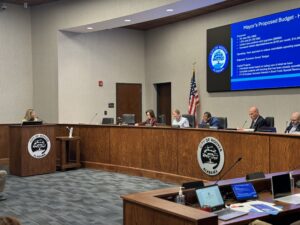Tommy Tuberville and colleagues introduce legislation to simplify federal grant process

On Thursday, U.S. Senator Tommy Tuberville and eight other Republican Senators introduced new legislation to ease the burdensome federal grant application process. Sen. Tuberville and his colleagues introduced the Simplifying Grants Act (S. 4799) to help local governments more easily navigate the federal grant process. “Congress should look for ways to cut red tape and make the government more efficient for the American people,” Tuberville said in a statement. “The Simplifying Grants Act will do just that, giving valuable time and resources back to public servants in smaller towns across the country. In a state like Alabama, where nearly 60 percent of counties would benefit from the changes in this bill, that time will be well spent on projects in those communities. I’m proud to join my colleagues in this effort to make it easier for small towns to access the tools they deserve.” Tuberville was joined by Sens Marco Rubio (R-Florida), Shelley Moore Capito (R-West Virginia), Susan Collins (R-Maine), John Cornyn (R-Texas), Mike Crapo (R-Idaho), James Risch (R-Idaho), Rick Scott (R-Florida), and Roger Wicker (R-Mississippi) in sponsoring the legislation. Sen. Rubio was the sponsor of the legislation. “Local governments use federal dollars to invest in infrastructure, public safety, law enforcement, and our children’s education, among other important priorities,” Rubio said. “Regretfully, our current grant process leaves small local governments and their residents behind. This bill would provide a simplified process, so small local governments are able to apply for and receive the funds they need.” The Simplifying Grants Act seeks to make it easier for smaller local governments to apply for federal grants by directing the Office of Management and Budget (OMB) and executive agencies to both simplify grant applications for local governments located in nonurbanized areas (populations of less than 50,000) and make checklists available that list each requirement of each step of the grant process for grants for which such local governments are eligible. The legislation would also fulfill certain reporting requirements. Smaller cities, counties, and local governments often face difficulties in applying for and receiving federal grant dollars because they don’t know they qualify for a program in order to know that they can apply or don’t know how to apply, so often have to seek outside assistance from grant writers. “While larger communities can navigate a complex federal grants process, Idaho’s small, rural communities are often overlooked and left behind, said Sen. Risch. “It is only fair that taxpayer dollars reach even the smallest corners of our state. Simplifying grants for our local governments will level the playing field and ensure that federal taxpayer dollars come back to their own communities.” In the 1980s, the U.S. Advisory Commission on Intergovernmental Relations (ACIR) found evidence showing that “federal aid programs have never consistently transferred income to the poorest jurisdictions or individuals” and that “unlike… other major federal systems, the United States lacks a systematic method for equalizing the fiscal resources of its states.” Since the ACIR’s landmark report, the total number of federal grants to state and local governments has grown by more than 135 percent, and the total amount of federal grant-in-aid to state and local governments increased by approximately 690 percent since ACIR’s finding. The unequal distribution of federal dollars can be explained by numerous factors, including the complexity of the application process. It is easier for larger local governments to hire dedicated grant writers and coordinators, so they can submit better applications and be more equipped to effectively utilize federally awarded funds. This gives larger local governments an advantage over less populated counties that typically have fewer staff and smaller budgets. With the Senate evenly divided between Republicans and Democrats and Democrats controlling the U.S. House of Representatives and the presidency, Rubio and Tuberville will need support from Democratic Senators to pass S. 4799. Tommy Tuberville is in his first term representing Alabama in the U.S. Senate. Tuberville unseated incumbent Sen. Doug Jones in the 2020 election. Prior to his Senate service, Tuberville was a career college football coach, including Auburn University. To connect with the author of this story, or to comment, email brandonmreporter@gmail.com.
GOP targets for Dem bill: Inflation, taxes, Joe Manchin, Kyrsten Sinema
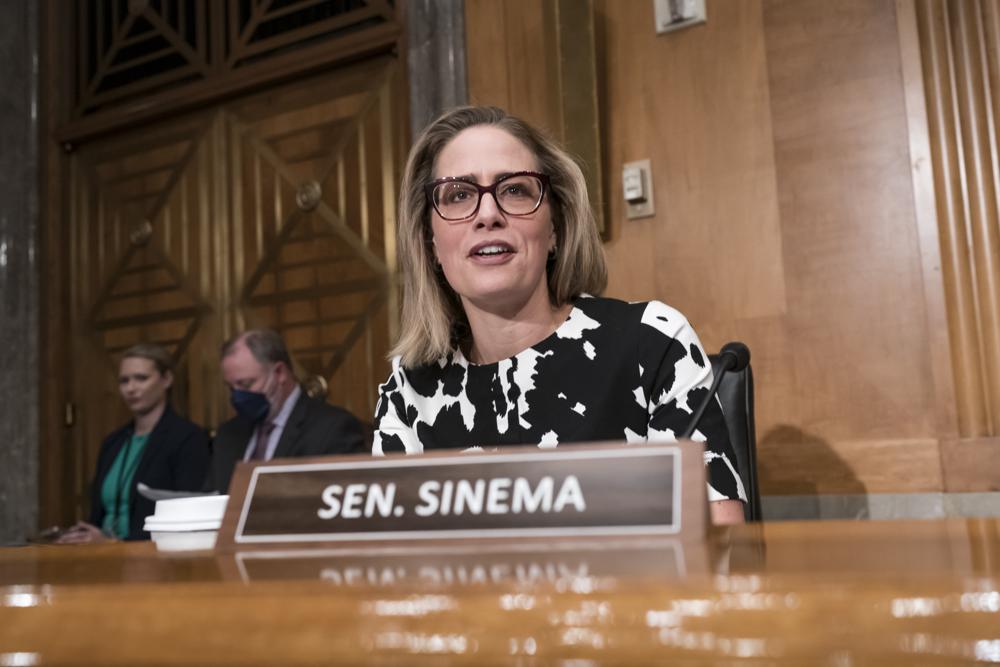
Republicans see inflation, taxes, and immigration as Democratic weak spots worth attacking, and two opposition senators as prime targets in the upcoming battle over an economic package the Democrats want to push through the Senate. The measure embodies some of the top environment, energy, health care, and tax policy aspirations that President Joe Biden and party leaders want to enact as voters start tuning in to this fall’s congressional elections. The GOP would like to derail or weaken the measure, or at least force Democrats to take votes that would be painful to defend in reelection campaigns. Republicans are already aiming fire at Sen. Joe Manchin, D-W.Va., who crafted the measure with Senate Majority Leader Chuck Schumer, D-N.Y., and unexpectedly pumped life into an effort most Democrats considered moribund. Manchin is a conservative Democrat from a deep red state who has scuttled his party’s priorities before, and Republicans have savaged him in recent days, an unsubtle signal that they’ll be coming for him should he seek reelection in 2024. “He made a terrible deal,” Senate Minority Leader Mitch McConnell, R-Ky., told reporters this week. “How he can defend this from a West Virginia point of view, or think of it as a centrist type of agreement, is astonishing. This is an agreement only Bernie Sanders would love.” Even Sen. Shelley Moore Capito, R-W.Va., who has a strong relationship with Manchin and seldom clashes with him publicly, lambasted the legislation for imposing a minimum tax on huge, profitable corporations that she said would hinder investments. “Like many West Virginians, I’m concerned that this tax increase will delay closing the digital divide” in rural communities, she said. Republicans are taking a softer approach with Sen. Kyrsten Sinema, D-Ariz., who has been coy about the legislation and has shown concerns about tax increases. She’s her party’s biggest question mark on this bill in the 50-50 chamber, where all Republicans seem certain to vote “no,” and she’s held several discussions with GOP senators during votes this week. Sinema has opposed past proposals to raise taxes on wealthy equity firm executives, which this time would raise around $14 billion of this legislation’s $739 billion in revenue. She met with Arizona manufacturers who oppose boosting the corporate minimum tax and thanked her afterward in a tweet for her “thoughtful approach & willingness to listen to AZ job creators.” “I don’t know what she thinks,” Idaho Sen. Mike Crapo, top Republican on the Senate Finance Committee, told reporters. “‘We are making our case’ is the best we can say.” The 10-year measure includes hundreds of billions in spending and tax breaks to encourage alternative energy production and to bolster fossil fuels with steps like tax breaks for technology that reduces carbon emissions. There’s also money to help people buy private health coverage and provisions giving Medicare the power to negotiate prices on some drugs with pharmaceutical makers. The bill “will lower costs, fight inflation, and secure historic wins in the fight against climate change,” Schumer said. The GOP seems certain to try stripping or toning down the corporate minimum tax and language raising taxes on wealthy equity firm executives as well and has hopes of winning over Sinema as the decisive vote for that. After she opposed Democrats’ proposed tax rate increases last year on corporations and high earners, they switched to a corporate minimum tax that she supported, but it is uncertain if she will do so now. Republicans could fashion amendments aimed at particular Democratic senators — such as one exempting coal producers from certain taxes in a play for Manchin. To buttress its argument, the GOP released an analysis by the nonpartisan Joint Committee on Taxation that Republicans said showed tax boosts for people earning below $400,000. That would violate Biden’s pledge to not boost levies on that income group. “Ordinary Americans would bear a substantial part of the burden of this tax increase,” said No. 2 Senate GOP leader John Thune of South Dakota. Democrats dismissed that attack, noting that the study omitted the effect of the bill’s health care and energy tax breaks for individuals. It also counted lower salaries, stock prices, and dividends it believes will occur as part of the effect the bill would have on people. Overall, the Congressional Budget Office said Wednesday the measure could trim federal deficits by around $305 billion. But $204 billion of that would come from improving IRS tax collections, which will be real if it occurs, but the nonpartisan agency does not count in its formal scoring of the bill’s impact. In a bow to dominant voter concerns about gasoline prices and overall consumer costs, Democrats call the bill the Inflation Reduction Act. Yet its impact on the nation’s worst bout with inflation in four decades seems likely to be limited. The University of Pennsylvania’s Penn Wharton Budget Model estimated the measure would “very slightly increase inflation until 2024 and decrease inflation thereafter,” though the changes would be “statistically indistinguishable from zero.” McConnell said that study showed the Democrats’ bill would “actually increase inflation in the short term and do nothing for inflation in the long term.” Democrats have cited a Moody’s Analytics report saying the bill would “nudge the economy and inflation in the right direction.” And they distributed a letter by five former Treasury secretaries, including Henry Paulson Jr., who served under GOP President George W. Bush, saying the measure would strengthen the economy, “lower costs for families, and fight inflation.” That battlefield suggests Republican amendments are likely on the subject of prices. One could imagine a proposal preventing the bill from taking effect unless inflation, or gasoline prices, fall to certain levels. Democratic leaders are trying this week to unify rank-and-file senators against such plans. The GOP could also try to renew immigration restrictions imposed by President Donald Trump that cited the pandemic as a reason to exclude migrants, an issue that sharply divides Democrats. And they might seek to delete tax credits aimed at encouraging alternative energy and that favor companies that pay union-scale wages. Republished with
Senate rejects Joe Biden’s vaccine mandate for businesses
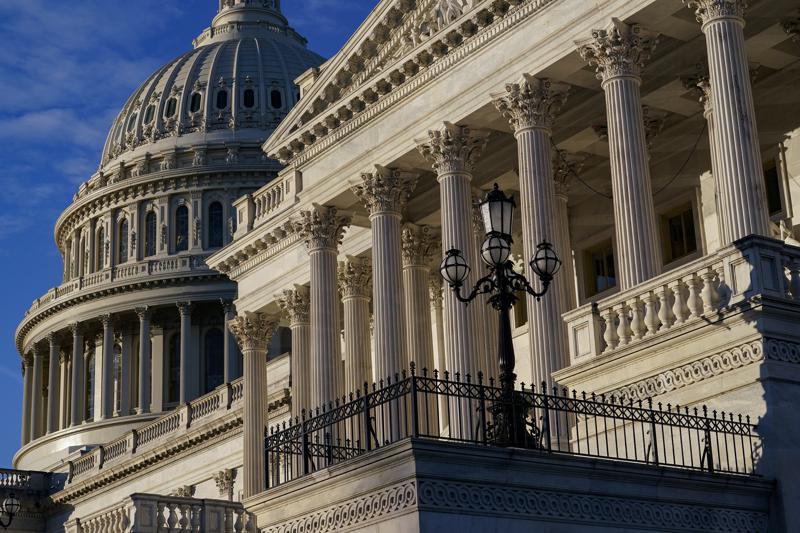
The Senate narrowly approved a resolution Wednesday to nullify the Biden administration’s requirement that businesses with 100 or more workers have their employees be vaccinated against the coronavirus or submit to weekly testing. The vote was 52-48. The Democratic-led House is unlikely to take the measure up, which means the mandate would stand, though courts have put it on hold for now. Still, the vote gave senators a chance to voice opposition to a policy that they say has sparked fears back home from businesses and from unvaccinated constituents who worry about losing their jobs should the rule go into effect. “Every so often Washington D.C. does something that lights up the phone lines. This is one of these moments,” said Sen. Steve Daines, R-Mont. At home, he said, “this issue is what I hear about. This issue is a top-of-mind issue.” Lawmakers can invalidate certain federal agency regulations if a joint resolution is approved by both houses of Congress and signed by the president, or if Congress overrides a presidential veto. That’s unlikely to happen in this case. Under the rule, private-sector companies with 100 or more workers must require their employees to be fully vaccinated against COVID-19 or be tested for the virus weekly and wear masks on the job. The Occupational Safety and Health Administration said it would work with companies on compliance but would fine them up to more than $13,000 for each violation, though implementation and enforcement is suspended as the litigation unfolds. Senate Majority Leader Chuck Schumer, D-N.Y., said Americans who have refused to get vaccinated are the biggest impediment to ending the pandemic. He implied that some of the resistance to mandated vaccines is based on politics. “Some of the anti-vaxxers here in this chamber remind me of what happened 400 years ago when people were clinging to the fact that the sun revolved around the Earth. They just didn’t believe science. Or 500 years ago when they were sure the Earth was flat,” Schumer said. Schumer said social media has played a role in spreading falsehoods about the vaccine, and “so has the far right.” He urged senators to vote against the resolution, sponsored by Sen. Mike Braun, R-Ind. Republicans said they are supportive of the vaccine, but that the mandate amounts to government overreach. “His mandates are under fire in the courts. Main Street job creators are complaining against it, and tonight, the U.S. Senate must send a clear message: back off this bad idea,” Braun said. Some argued that the mandate may even contribute to people not getting vaccinated. “I think, actually, the mandate has made it worse in terms of hardening people who don’t want to be told what to do by the government,” said Sen. John Barrasso, R-Wyo. Sen. Shelley Moore Capito, R-W.Va., said a telephone town hall she recently held with constituents made clear they are concerned about keeping their a job if the mandate goes into effect. “If you look at my state, 40% of my state’s workforce stands to lose their job under this mandate,” Capito said. “It will be a killer to our economy.” In the end, two Democratic lawmakers voted with 50 Republicans to void the mandate, Sens. Joe Manchin of West Virginia and Jon Tester of Montana. Manchin had said in a tweet that he does not support any federal vaccine mandate for private businesses. Tester’s office said his opposition is based on conversations with Montana businesses who “expressed deep concerns about the negative effect on their bottom lines and our state’s economy during this fragile recovery period.” Sen. Patty Murray, D-Wash., sided with the Biden administration, noting that the pandemic is still raging and that deaths are overwhelmingly among the unvaccinated. “How on earth does it make sense right now to undercut one of the strongest tools that we have to get people vaccinated and stop this virus?” Murray said. “In what world is that a good idea?” The White House released a statement earlier this week stating that Biden’s advisers would recommend he veto the resolution in the unlikely event it makes it to his desk. “The president wants to see Americans back on the job, and Americans back at work should not face risk from those who are not vaccinated and who refuse to be tested,” the White House said. Deaths in the United States stemming from COVID-19 are running close to 1,600 a day on average. The overall U.S. death toll less than two years into the pandemic could soon reach 800,000. Republished with the permission of the Associated Press.
GOP filibuster blocks Democrats’ big voting rights bill
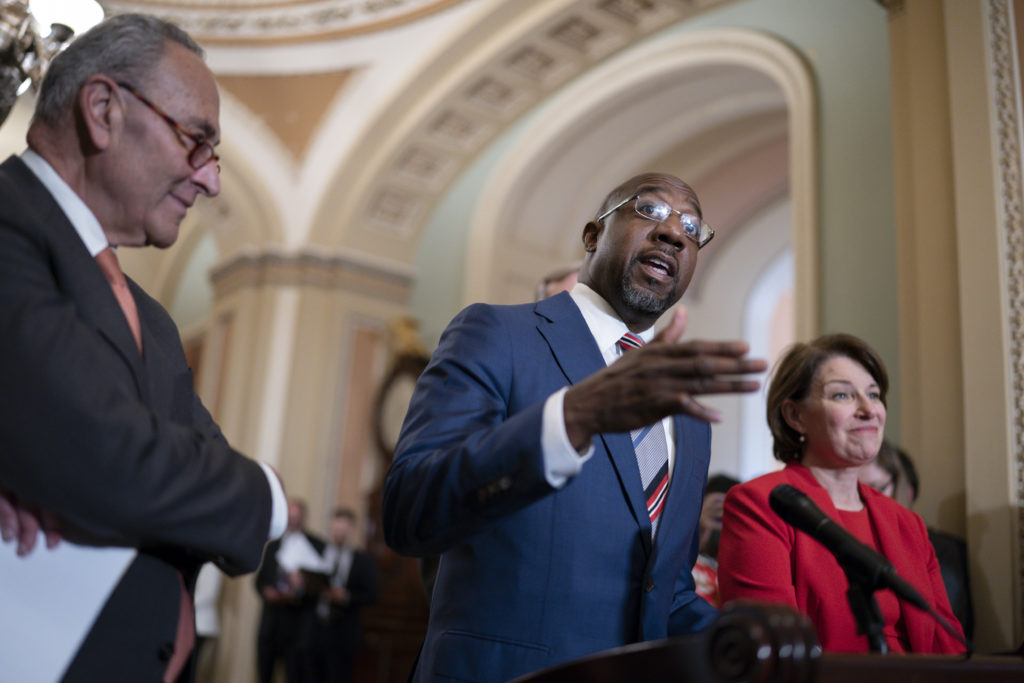
The Democrats’ sweeping attempt to rewrite U.S. election and voting law suffered a major setback in the Senate Tuesday, blocked by a filibuster wall of Republican opposition to what would be the largest overhaul of the electoral system in a generation. The vote leaves the Democrats with no clear path forward, though President Joe Biden declared, “This fight is far from over.” The bill, known as the For the People Act, would touch on virtually every aspect of how elections are conducted, striking down hurdles to voting that advocates view as the Civil Rights fight of the era, while also curbing the influence of money in politics and limiting partisan influence over the drawing of congressional districts. But many in the GOP say the measure represents instead a breathtaking federal infringement on states’ authority to conduct their own elections without fraud — and is meant to ultimately benefit Democrats. It failed on a 50-50 vote after Republicans, some of whom derided the bill as the “Screw the People Act,” denied Democrats the 60 votes needed to begin debate under Senate rules. Vice President Kamala Harris, the first Black woman to hold her office, presided over the chamber as the bill failed to break past that filibuster barrier. Biden praised Senate Democrats for standing together “against the ongoing assault of voter suppression that represents a Jim Crow era in the 21st Century.” In a statement from the White House, he said that in their actions, though unsuccessful on Tuesday, they “took the next step forward in this continuous struggle.” The rejection forces Democrats to reckon with what comes next for their top legislative priority in a narrowly divided Senate. They’ve touted the measure as a powerful counterweight to scores of proposals advancing in GOP-controlled statehouses making it more difficult to vote. “Once again, the Senate Republican minority has launched a partisan blockade of a pressing issue,” Senate Majority Leader Chuck Schumer said from the chamber floor. He vowed that the vote was the “starting gun” and not the last time voting rights would be up for debate. Whatever Democrats decide, they will likely be confronted with the same challenge they faced Tuesday when minority Republicans used the filibuster — the same tool that Democrats employed during Donald Trump’s presidency — to block consideration of the bill. Republicans showed no sign of yielding. Republican leader Mitch McConnell called the bill a “a solution looking for a problem” and vowed to “put an end to it.” Texas Sen. Ted Cruz dismissed it as “partisan legislation, written by elected Democrats, designed to keep elected Democrats in office.” And, more graphically, Sen. Shelley Moore Capito called the bill “a despicable, disingenuous attempt to strip states of their constitutional right to administer elections” that “should never come close to reaching the president’s desk.” Pressure has been mounting on Democrats to change Senate rules or watch their priorities languish. A group of moderate Democratic senators, however, including Sens. Joe Manchin and Kyrsten Sinema, have ruled that out, denying the votes needed to make a filibuster change. Biden has vowed what the White House calls the “fight of his presidency” over ensuring Americans’ access to voting. But without changes to Senate rules, key planks of his agenda, including the voting bill, appear stalled. Sen. Raphael Warnock, a Georgia Democrat and senior pastor at the Atlanta church Martin Luther King Jr. once led, called minority Republicans’ willingness to prevent debate on the voting bill a “dereliction” of duty. “What could be more hypocritical and cynical than invoking minority rights in the Senate as a pretext for preventing debate about how to preserve minority rights in the society,” Warnock said during a floor speech Tuesday. The changes being enacted in many Republican states are decried by voting rights advocates who argue the restrictions will make it more difficult for people to cast ballots, particularly minority residents who tend to support Democrats. Republicans, cheered on by Trump, talk instead about fighting potential voting fraud and say the Democrats’ concerns are wildly overblown. As the Senate discussion churns, more changes could be coming to the bill. Democrats want to protect against intimidation at the polls in the aftermath of the 2020 election. They propose enhancing penalties for those who would threaten or intimidate election workers and creating a “buffer zone” between election workers and poll watchers, among other possible changes. They also want to limit the ability of state officials to remove local election officials. Georgia Republicans passed a law earlier this year that gives the GOP-dominated Legislature greater influence over a state board that regulates elections and empowers it to remove local election officials deemed to be underperforming. But Democrats have divisions of their own. Until Tuesday, it wasn’t even clear that they would be united on the vote to bring the bill up for debate. Manchin, a moderate from West Virginia, announced earlier this month that he couldn’t support the bill because it lacked Republican support. Manchin flipped his vote to a “yes” after Democrats agreed to consider his revised version. His proposal was endorsed by former President Barack Obama and called a “step forward” by Biden’s administration. Manchin has proposed adding provisions for a national voter ID requirement, which is anathema to many Democrats, and dropping a proposed public financing of campaigns. Those changes did little, however, to garner the bipartisan support Manchin was hoping for. Senate Republicans said they would likely reject any legislation that expands the federal government’s role in elections. McConnell dismissed Manchin’s version as “equally unacceptable.” Sen. Lisa Murkowski, a moderate Alaska Republican, said some aspects of the Democratic bill were laudable and she supports other voting rights legislation, like a reinstatement of the Voting Rights Act struck down by the Supreme Court in 2013. But, ultimately, she said the “sprawling” bill amounted to “a one-size-fits-all mandate coming out of Washington D.C.” that “in many cases doesn’t work.” Months in the making, Tuesday’s showdown had taken on fresh urgency as Trump continues to challenge
Senators eye $579B in new infrastructure spending, $1T plan
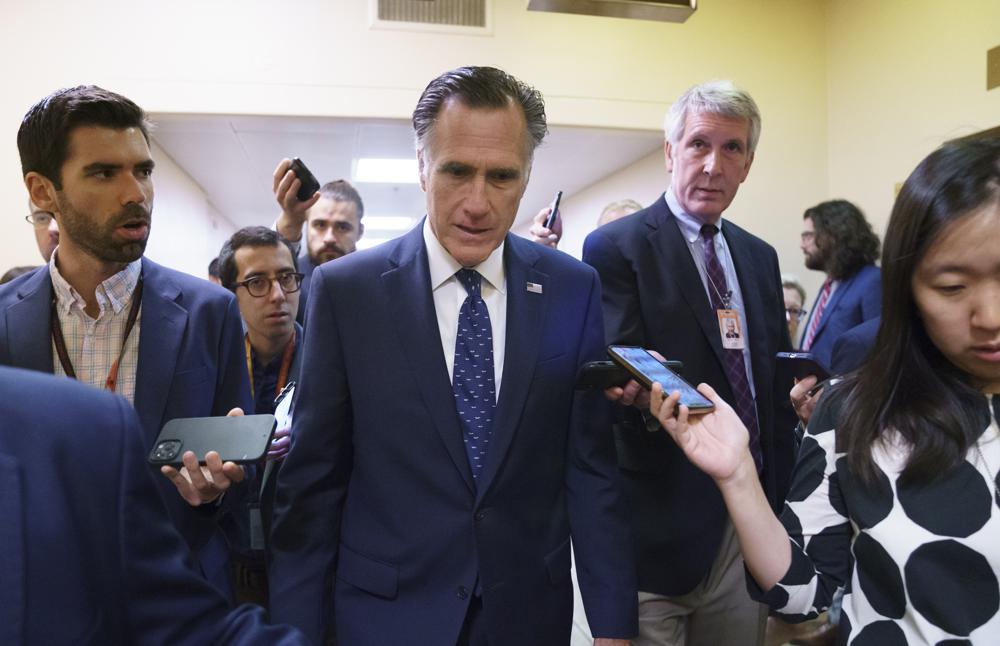
A bipartisan group of senators is eyeing an infrastructure deal with $579 billion in new spending as negotiators try to strike a nearly $1 trillion deal on President Joe Biden’s top priority, according to those briefed on the plan. The 10 senators have been huddling behind closed doors, encouraged by Biden to keep working on the effort after he walked away from a Republican-only proposal this week, unable to resolve differences. The senators are briefing their colleagues privately and cautioned changes could still be made. “Our group – comprised of 10 Senators, 5 from each party – has worked in good faith and reached a bipartisan agreement on a realistic, compromise framework to modernize our nation’s infrastructure and energy technologies,” the senators said in a joint statement. “This investment would be fully paid for and not include tax increases,” they added. “We are discussing our approach with our respective colleagues and the White House and remain optimistic that this can lay the groundwork to garner broad support from both parties and meet America’s infrastructure needs.” The White House said Democratic senators briefed the administration on the emerging plan, but questions remain. “The President appreciates the Senators’ work to advance critical investments we need to create good jobs, prepare for our clean energy future, and compete in the global economy,” said deputy press secretary Andrew Bates. “Questions need to be addressed, particularly around the details of both policy and pay-fors, among other matters.” The president and Congress have been straining to reach an agreement on his ideas for infrastructure investment, stuck over the scope of the package of road, highway, and other projects and how to pay for it. Lawmakers say the group’s tentative agreement represents important progress in fashioning a bill that can pass such an evenly divided Congress this year, but they are also aware that it could easily unravel. A person familiar with the negotiations but unauthorized to discuss them publicly said the cost would be $974 billion over five years, as is standard for highway spending, or $1.2 trillion if spread over eight as Biden proposes. At that size, the new package would be more than the previous Republican-only effort of $330 billion in new spending in a $928 billion package, but still short of the $1.7 trillion over eight years Biden is seeking. It appears the group is running into the same problems that Biden and lead Republican negotiator Sen. Shelley Moore Capito confronted in agreeing on how to pay for it. Sen. Bill Cassidy, R-La., a lead negotiator, would not disclose the final tab. Asked if the new spending was at $600 billion, he said, “the president said that was his goal. So I don’t think anybody felt like they had to exceed his goal.” Another member of the group, Sen. Jon Tester, D-Mont., said they are “fairly close” on a topline amount but are still debating how to pay for it. One option is to include potential revenue from uncollected income taxes, he said. “We still have to talk,” Tester said. One Republican not in the group, Sen. Mike Braun of Indiana, said he was told the package would provide nearly $1 trillion — including $579 billion in new spending over the baseline for transportation projects. Braun also said parts of it would be paid for with untapped COVID-19 relief funds, which has been a nonstarter for the White House. “They have come up with similar to what I think Capito was working on, but my understanding is it would be a little more money,” he said. Biden tasked the senators to keep working as he set out for his first overseas trip after talks collapsed this week with Capito and the GOP senators. The president is seeking a sweeping investment in not just roads, highways, and bridges but also broadband, electric vehicle charging stations, and other aspects of what he views as the new economy paid for with a hike in the corporate tax rate from 21% to 28%. Republicans prefer a more narrow focus on fixing existing transportation systems, with more modest investments elsewhere. They oppose any tax hikes to pay for the new spending. With the Senate narrowly split, 50-50, and most legislation requiring 60 votes to advance past a filibuster, Biden is seeking a bipartisan agreement to ensure passage. At the same time, he is also instructing Democrats who control the House and Senate to prepare to pass portions of the package on their own, under special budget rules that enable approval with 51 votes in the Senate. In the evenly-divided Senate, Vice President Kamala Harris serves as a tie-breaking vote. Meanwhile, a House panel advanced legislation early Thursday that serves as an important building block for that chamber’s infrastructure efforts. The bill aims to boost federal spending on roads, bridges, transit, and rail. The $547 billion package passed mostly along party lines by a vote of 38-26 and will likely be considered by the full House later this month. Republished with the permission of the Associated Press.
Joe Biden ends GOP infrastructure talks, starts new negotiations
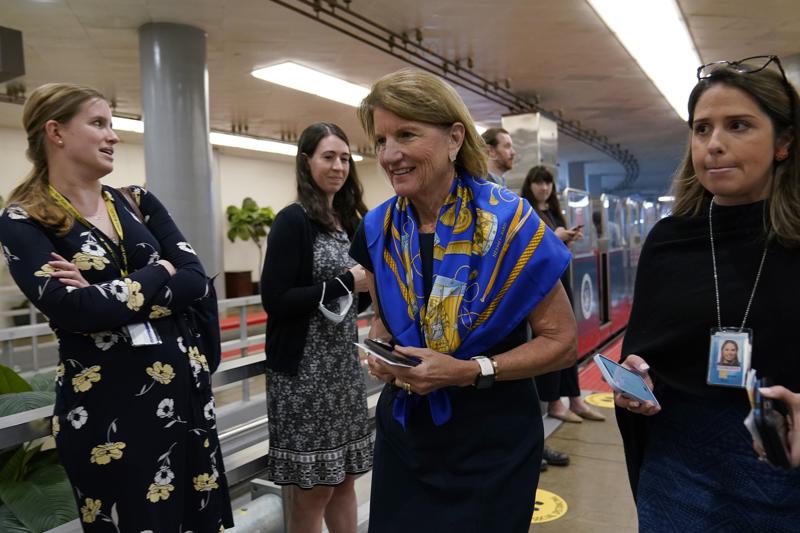
President Joe Biden ended talks with a group of Republican senators on a big infrastructure package on Tuesday and started reaching out to senators from both parties in a new effort toward bipartisan compromise, setting a summer deadline for Congress to pass his top legislative priority. The president is walking away from talks with lead Republican negotiator Sen. Shelley Moore Capito after the two spoke Tuesday, but would welcome her in the new bipartisan group, according to an administrative official who spoke on condition of anonymity to discuss the private negotiations. At the same time, with anxiety running high as time slips by, Democrats are laying the groundwork to pass some or all of the ambitious package on their own. Biden conferred Tuesday with House Speaker Nancy Pelosi and Senate Majority Leader Chuck Schumer about launching the budget resolution process for Senate votes in July, the White House said. “The President is committed to moving his economic legislation through Congress this summer, and is pursuing multiple paths to get this done,” White House press secretary Jen Psaki said in a statement. The breakdown comes after weeks of prolonged infrastructure talks between the president and Capito as the two sides failed to broker the divide over the scope of Biden’s sweeping infrastructure investment and how to pay for it. The Republican senators offered a $928 billion proposal, which included about $330 billion in new spending — but not as much as Biden’s $1.7 trillion investment proposal for rebuilding the nation’s roads, bridges, highways and other infrastructure, including Veterans Affairs hospitals and care centers. Biden has proposed raising the corporate tax rate from 21% to 28%, a nonstarter for Republicans, and rejected the GOP senators’ suggestion of tapping unspent COVID-19 aid money to fund the new infrastructure spending. In a statement, Capito said she was disappointed Biden ended the talks, but also expressed interest in ongoing bipartisan work. “While I appreciate President Biden’s willingness to devote so much time and effort to these negotiations, he ultimately chose not to accept the very robust and targeted infrastructure package, and instead, end our discussions,” she said. “However, this does not mean bipartisanship isn’t feasible.” As Biden aims for a compromise deal, he has begun reaching out to other senators, including Republican Sen. Bill Cassidy of Louisiana and two key centrist Democrats, Joe Manchin of West Virginia and Sen. Kyrsten Sinema of Arizona, whose votes will be crucial in the evenly split Senate. Those senators receiving phone calls from Biden are engaged in bipartisan talks, and a bipartisan group with Sen. Mitt Romney, R-Utah, was meeting later Tuesday at the Capitol to negotiate a fresh proposal. Psaki said the president urged the senators to continue their work “to develop a bipartisan proposal that he hopes will be more responsive to the country’s pressing infrastructure needs.” Biden tapped Cabinet and White House aides to meet with the senators in person. With the narrowly split House and the 50-50 Senate, the White House faces political challenges pushing its priorities through Congress with Democratic votes alone. Biden’s party holds a slight majority in the Senate because Vice President Kamala Harris can break a tie. The special budget rules could provide Biden with an alternative path, particularly in the Senate, because they allow legislation to be approved with a 51-vote threshold, rather than the 60 votes typically needed to advance a bill past a filibuster — in this case, led by Republicans against the Biden package. Democrats are watching warily as time passes and anxiety builds toward an agreement, with many lawmakers worried they are not fulfilling their campaign promises to voters who put the party in control of Congress and the White House. During a private discussion of Democratic senators at lunch Tuesday, there were differing views over whether they should keep talking with Republicans or pursue an approach that would allow them to pass a bill on their own, through the budget reconciliation process. Schumer told reporters afterward that Democrats are pursuing “a two-path approach.” The bipartisan talks led by Sinema with the other senators are underway, Schumer said, while the budget committee is preparing the legislation that would allow passage through the reconciliation process. “It may well be that part of the bill that is passed will be bipartisan, and part of it will be in reconciliation,” he said. “But we’re not going to sacrifice bigness and boldness.” The president is expected to engage with lawmakers while he sets out this week on his first foreign trip for an economic summit of the Group of Seven industrialized nations in Europe. Ahead of Biden’s announcement, the White House had also spoken to other lawmakers, including from the House. Rep. Josh Gottheimer, D-N.J., and Rep. Brian Fitzpatrick, R-Pa., the co-chairs of the bipartisan Problem Solvers Caucus, spoke late Monday with Brian Deese, director of the White House National Economic Council, about bipartisan efforts to reach an infrastructure deal, according to an aide who spoke on condition of anonymity to discuss the private conversations. Gottheimer is also working with Cassidy and Sinema from the senators’ group, the aide said. Republished with the permission of the Associated Press.
Joe Biden, GOP senator talk as time drags on infrastructure deal
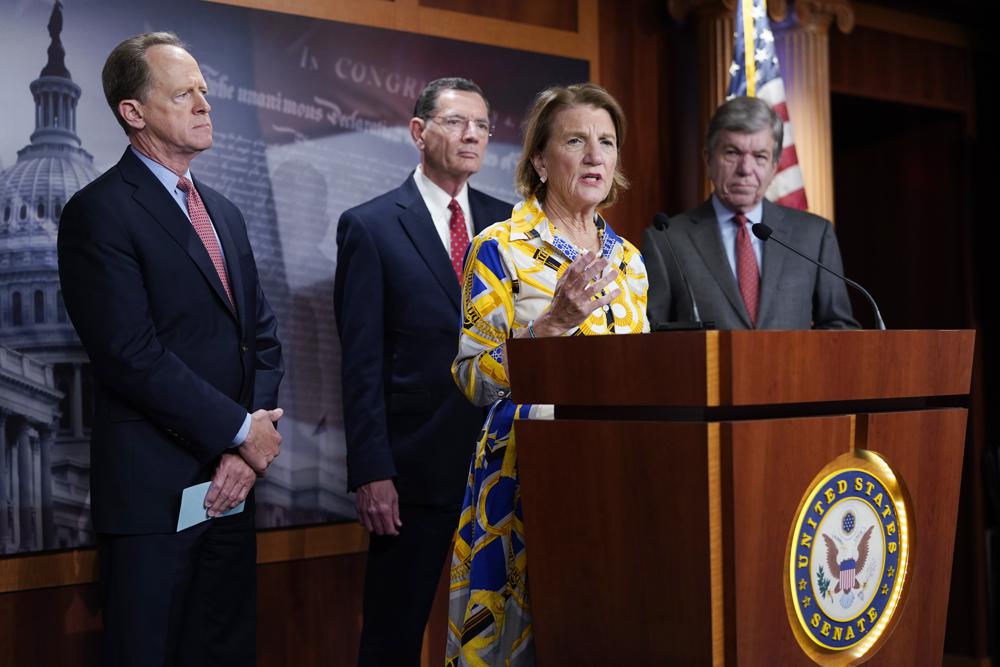
For nearly an hour, President Joe Biden and the top Senate Republican negotiating infrastructure met behind closed doors — two seasoned legislators engaged in another round of conversations, but emerging with few outward signs of tangible progress ahead of a deadline next week. The White House billed the private meeting Wednesday as more of a conversation with West Virginia GOP Sen. Shelley Moore Capito rather than a formal negotiation. No new offers were expected to be presented. More than anything, the session in the Oval Office was seen through the political lens of the president and Republicans trying to show the public what Americans say they want — a willingness to work together, even if no deal is within reach. Biden and Capito had a “constructive and frank conversation,” according to a White House official granted anonymity to discuss the private talks. The senator’s office said she is encouraged by the ongoing conversations. The two agreed to reconnect Friday. Still, talks over Biden’s top legislative priority have been moving slowly, a daunting undertaking given the massive infrastructure investment, and time for a deal is running out. The administration has set a June 7 deadline to see clear direction and signs of progress. “The fact that the president is having Sen. Capito here today and has been having ongoing discussions with Republicans in the Senate and that he’s eager to find a path forward on bipartisanship work certainly tells you, I think, what you need to know about what he thinks about working with people even when there’s disagreement,” White House Press Secretary Jen Psaki said ahead of the afternoon session. Privately, the president has sized up the GOP’s latest $928 billion offer as unworkable, in large part because it taps unused COVID-19 funds. Instead, Biden wants to hike the corporate tax rate — a nonstarter for Senate Republicans — to generate revenue for his $1.7 trillion package. The ongoing talks may take on new importance after Democrats suffered a setback Wednesday in their efforts to attempt to pass this and other Biden priorities on party-line votes. The Senate parliamentarian signaled new limits on how many times Democrats can use the budget reconciliation process that allows a 51-vote threshold, rather than the 60 votes typically needed to advance legislation. In a four-page memo, the parliamentarian made it clear Democrats will likely have only more only one more opportunity to use the budget process this year, essentially closing the door on a strategy they were eyeing for multiple votes. Friday’s next round of talks between Biden and the Republican senator would overlap with the release of the May jobs report, as private economists estimate a meaningful increase from the disappointing April figures. May’s jobs figures could provide evidence as to whether Biden’s earlier $1.9 trillion COVID-19 relief package has helped put the country on track to recover the jobs lost to the pandemic. Heading into the meeting, Capito was expected to re-up the GOP’s push to repurpose the coronavirus relief fund to pay for infrastructure investments, said Senate Republican leader Mitch McConnell, who has tasked her to lead the discussions. “That’s the key to getting a bipartisan agreement,” McConnell said at a press conference in Kentucky. He said he particularly wants to halt unemployment assistance that he says is preventing Americans from returning to work. “The coronavirus is behind us. We need to get back to work,” McConnell said. Together, the president and the Republicans both have political incentives to negotiate a bipartisan accord over his sweeping investment package, even if no deal is within sight. For Biden, reaching across the aisle and cutting deals in Congress is central to his brand of politics. Republicans can also score political gains by trying to work with a popular president. Yet an initial Memorial Day deadline came and went without results, and in the latest round of talks, Biden and a core group of GOP senators appear to have pulled farther apart. Democrats, who hold slim majorities in the House and Senate, are watching warily as the White House and Republicans try to narrow the gap between the president’s initial ideas for a massive investment in not just roads and bridges but the “human” infrastructure of hospitals and child and senior care facilities, and a GOP approach that is more focused on traditional infrastructure projects. The White House has pared back the president’s initial $2.3 trillion bid, now tallied at $1.7 trillion, with Biden proposing to fund the investment by raising the corporate tax rate from 21% to 28%. Without a bipartisan agreement with Republicans, Biden will be faced with trying to muscle support from Democrats alone. That approach also poses political challenges, particularly in the evenly split Senate, where the administration has no votes to spare if the president tries to push through the package under the budget rules that allow for a simple majority vote. Psaki downplayed comments Biden had made Tuesday that were seen as critical of two Democrats, presumably Sen. Joe Manchin of West Virginia and Sen. Krysten Sinema of Arizona. Speaking in Tulsa, Oklahoma, he noted Democrats who don’t always vote with the party, blaming them for stalling his agenda. Psaki said the president considers both Manchin and Sinema “good working partners” and pointed to the Capito meeting as an example of his willingness to cross the divide to hash out issues. Biden’s own thinking is that the Republican proposal, while improved from an earlier $568 billion opening bid, is unworkable because the Republicans want to tap unspent COVID-19 funds to pay for the spending. The president, in meetings with his team, has zeroed in on the questions the GOP proposal raises — namely, which coronavirus relief funds to possibly shelve. Biden’s view is that tapping the COVID-19 funds would unduly burden the middle class, including small business owners, who are receiving aid during the pandemic crisis. For Republicans, the corporate tax hikes are a red line they will not cross. They instead want to pay for the infrastructure investment
Joe Biden, GOP senators upbeat, plan more infrastructure talks
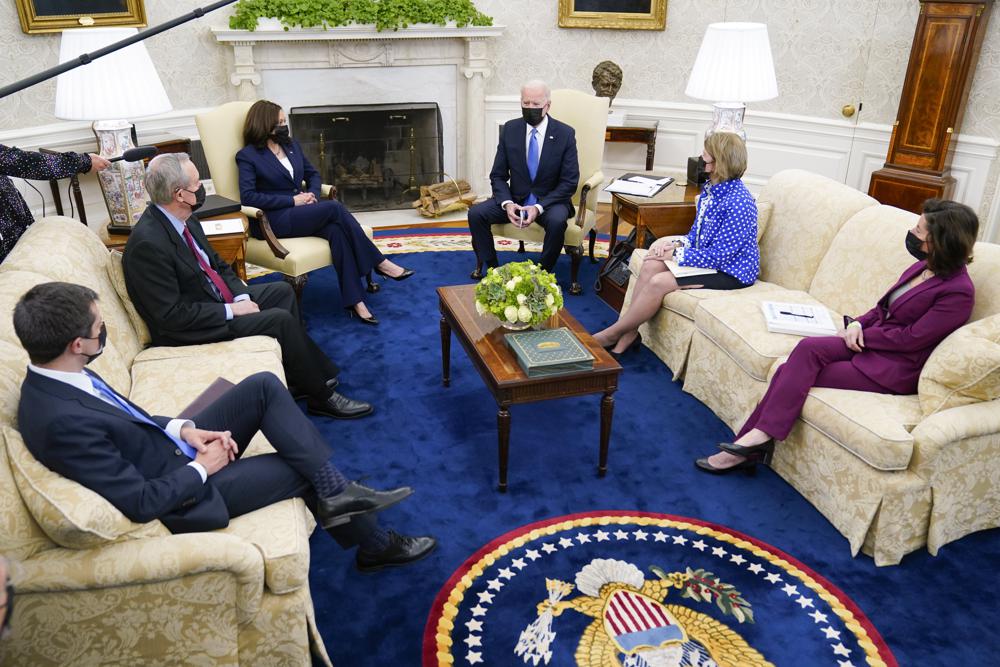
After meeting at the White House, President Joe Biden and a group of Republican senators agreed to talk again early next week as negotiations intensified Thursday over a potentially bipartisan infrastructure package that could become one piece of the administration’s ambitious $4 trillion public investment plan. The GOP senators exited the more than 90-minute meeting “encouraged” about their discussions with the president and prepared to build on the $568 billion proposal they had put forward last month as an alternative to his sweeping American jobs and families plans. “The president asked us to come back and rework an offer so that he could then react to that,” said Sen. Shelley Moore Capito of West Virginia, who is leading the group. “We’re very encouraged,” she told reporters outside the White House. “The attitude the president had in the Oval Office with us was very supportive and desirous of striking a deal.” Biden also emerged upbeat. “I am very optimistic that we can reach a reasonable agreement — and even if we don’t it’s been a good-faith effort,” Biden said in the Rose Garden. Biden is intent on at least trying to strike a deal with Republicans rather than simply going it alone with a Democrats-only bill, which might in some ways be a more politically viable route in a Congress held by the president’s party with only the slimmest of majorities. One strategy that appears to be coming into focus would be for Biden to negotiate a more limited, traditional infrastructure bill of roads, highways, bridges, and broadband as a bipartisan effort. Then, Democrats could try to muscle through the remainder of Biden’s priorities on climate investments and the so-called human infrastructure of child care, education, and hospitals on their own. “I’m willing to negotiate,” Biden said earlier at the White House. But the president has indicated that he’s not about to wait indefinitely for a compromise that may or may not come, and reiterated his view Thursday that “doing nothing is not an option.” The White House said the president stressed that inaction was a “red line for him.” He set a Memorial Day deadline for progress on a bipartisan deal. Those gathered included some of the top-ranking Republicans — Sens. John Barrasso of Wyoming, Roy Blunt of Missouri, Mike Crapo of Idaho, Pat Toomey of Pennsylvania, and Roger Wicker of Mississippi. Joining Biden were Vice President Kamala Harris, Transportation Secretary Pete Buttigieg, and Commerce Secretary Gina Raimondo. Thursday’s meeting followed a lengthy session at the White House with the congressional leadership the day before. Republican leader Mitch McConnell has said his side will accept spending as much as $800 billion, but Republicans made it clear they would refuse to embrace Biden’s broad proposals or his idea of raising taxes on corporations and the wealthy to pay for the plans. The White House outreach is part political strategy, part practical legislating. Striking a deal with Republicans would give all sides a political win — a rare bipartisan accomplishment — without fully forfeiting the president’s broader goals, which are largely shared by Democrats. It also acknowledges the “red line” that McConnell has drawn agaiTfnst GOP votes for undoing the 2017 tax law by raising taxes on corporations or those earning more than $400,000. “I want to get a bipartisan deal on as much as we can get a bipartisan deal on — and that means roads, bridges, broadband, all infrastructure,” Biden said Wednesday on MSNBC. “And then fight over what’s left and see if I can get it done without Republicans if need be.” Capito has taken the lead for Senate Republicans, keeping in close contact with both the president’s team and McConnell, she said, as she shuttles between the White House and Capitol Hill. The West Virginia senator is no stranger to the legislative process, serving more than a decade in the House and now as the ranking Republican on the Senate Energy and Public Works Committee. She ushered a $35 billion bipartisan water resources bill to passage in the Senate and is hard at work with the panel’s Democratic chairman, Tom Carper of Delaware, a Biden ally, on a big surface transportation bill. Biden personally reached out to Capito late last week after the water bill cleared the Senate. “The president he expressed on the phone with me, and has with others, that you know he’s anxious to move forward,” she said. “His desire is to define where we have common ground and I think we’ll probably spend the bulk of the time talking about that.” Biden has insisted he doesn’t want working-class Americans to bear the “burden” of paying for all the new infrastructure investments alone, resisting GOP plans for taxes and user fees, like tolls, to fund the projects. One potential new funding source could be the more than $1 trillion in unpaid taxes each year. House Speaker Nancy Pelosi has mentioned tapping that potential funding source and she said Biden discussed it at their meeting Wednesday. Republicans have not resisted it. “That’s a big chunk that would go a long way,” she said Thursday. McConnell and House Republican leader Kevin McCarthy have insisted they want the infrastructure bills to go through the committee process, where lawmakers can hammer out the details and take ownership of the proposals, rather than have the package negotiated in their leadership suites. Republished with the permission of the Associated Press.
Tommy Tuberville joins other leaders to change sexual assault investigations in the military
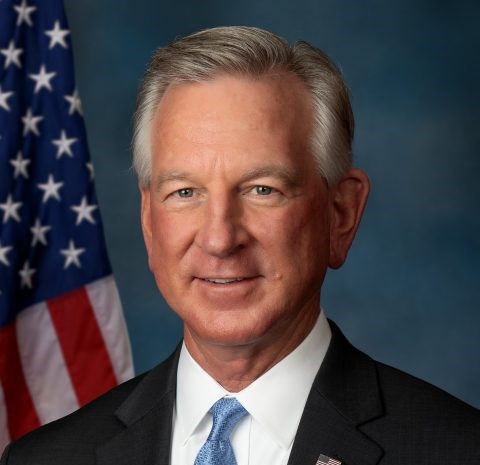
U.S. Senator Tommy Tuberville has joined a bipartisan group of senators to support a bill that will change the way the military conducts sexual assault investigations and prosecutions. Tuberville, a member of the Senate Armed Services Committee Subcommittee on Personnel, joined U.S. Senators Kirsten Gillibrand (D-NY), Chuck Grassley (R-IA), Joni Ernst (R-IA), Richard Blumenthal (D-CT), Ted Cruz (R-TX), Jeanne Shaheen (D-NH), Mark Kelly (D-AZ), and 28 other Senators to introduce the Military Justice Improvement and Increasing Prevention Act. According to the press release, the legislation “keeps the prosecution of sexual assault crimes within the military but moves the decision to prosecute to independent, trained, professional military prosecutors, and provides for several new prevention provisions such as better training for commanders and increased physical security measures, while ensuring that commanders still have the ability to provide strong leadership and ensure a successful command climate.” Tuberville stated, “Our men and women in uniform sacrifice every day to keep us safe, often working in some pretty unsafe places around the world. The last thing they should be worrying about is whether they’re unsafe within their ranks, and they certainly shouldn’t have to fear retaliation if they report a sexual assault. This bill is what happens when a bipartisan group of senators come together to get something done. I’m thankful that Senator Gillibrand and Senator Ernst have led the charge, and I’m glad to join my colleagues in support of this bill that will help improve the way the military handles sexual assaults so survivors can get the justice they deserve.” The bill was introduced in 2019, but did not receive a vote. Specifically, the legislation would: Move the decision on whether to prosecute serious crimes to independent, trained, and professional military prosecutors, while leaving misdemeanors and uniquely military crimes within the chain of command. Ensure the Department of Defense supports criminal investigators and military prosecutors through the development of unique skills needed to properly handle investigations and cases related to sexual assault and domestic violence. Require the Secretary of Defense to survey and improve the physical security of military installations– including locks, security cameras, and other passive security measures – to increase safety in lodging and living spaces for service members. Increase, and improve training and education on military sexual assault throughout our armed services. Kirsten Gillibrand stated on Twitter, “Here’s a bipartisan mission we can all support: Survivors of military sexual assault deserve justice. I’m proud to have @JoniErnst join me this week to introduce our new, improved bill to reform the military justice system and invest in prevention.” Here’s a bipartisan mission we can all support: Survivors of military sexual assault deserve justice. I’m proud to have @joniernst join me this week to introduce our new, improved bill to reform the military justice system and invest in prevention. https://t.co/pYYUL6IRyA — Kirsten Gillibrand (@SenGillibrand) April 27, 2021 The legislation is cosponsored by U.S. Senators Kirsten Gillibrand (D-NY), Chuck Grassley (R-IA), Joni Ernst (R-IA), Richard Blumenthal (D-CT), Ted Cruz (R-TX), Jeanne Shaheen (D-NH), Tammy Baldwin (D-WI), Chris Van Hollen (D-MD), Angus King (I-ME), Michael Braun (R-IN), Dick Durbin (D-IL), Tammy Duckworth (D-IL), Michael Bennet (D-CO), Rand Paul (R-KY), Chris Coons (D-DE), Mark Kelly (D-AZ), Sherrod Brown (D-OH), Bob Casey Jr. (D-PA), Maggie Hassan (D-NH), Mazie K. Hirono (D-HI), Amy Klobuchar (D-MN), Patrick Leahy (D-VT),Elizabeth Warren (D-MA), Ron Wyden (D-OR), Cynthia Lummis (R-WY), Dianne Feinstein (D-CA), Catherine Cortez Masto (D-NV), Raphael Warnock (D-GA), Alex Padilla (D-CA), Shelley Moore Capito (R-WV), Gary C. Peters (D-MI), Tim Kaine (D-VA), Tina Smith (D-MN), Bob Menendez (D-NJ), and Martin Heinrich (D-NM).
GOP lawmakers urge Joe Biden to meet with them on virus relief
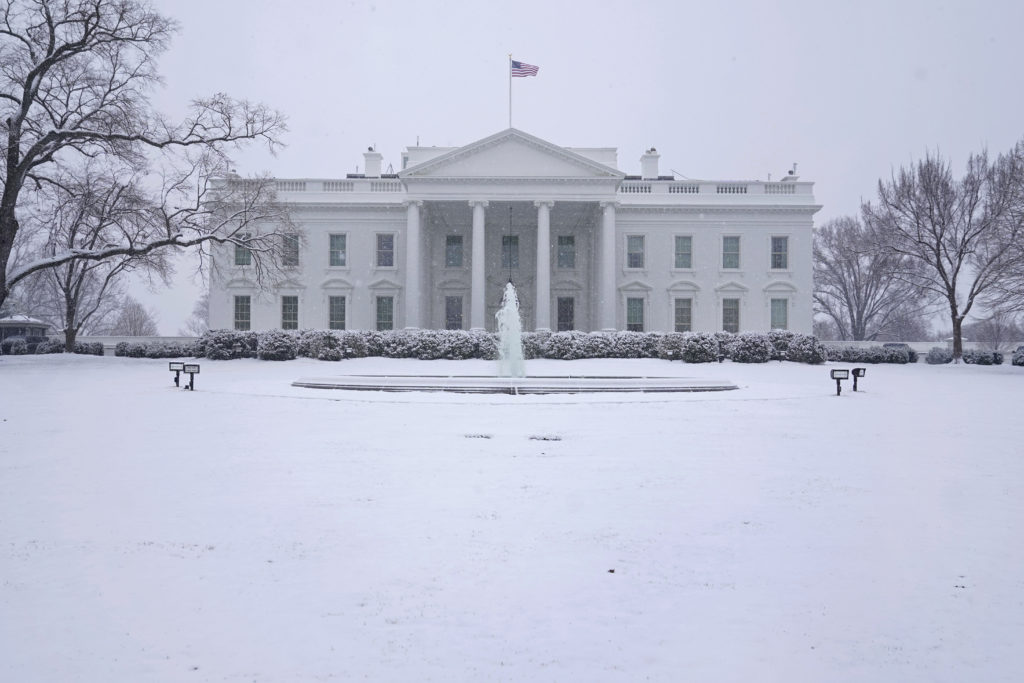
Ten Republican senators on Sunday proposed spending about one-third of what President Joe Biden is seeking in coronavirus aid and urged him to negotiate rather than try to ram through his $1.9 trillion package solely on Democratic votes. In challenging Biden to fulfill his pledge of unity, the group said in a letter that their counterproposal will include $160 billion for vaccines, testing, treatment, and personal protective equipment and will call for more targeted relief than Biden’s plan to issue $1,400 stimulus checks for most Americans. Winning the support of 10 Republicans would be significant for Biden in the 50-50 Senate where Vice President Kamala Harris is the tie-breaker. If all Democrats were to back an eventual compromise bill, the legislation would reach the 60-vote threshold necessary to overcome potential blocking efforts and pass under regular Senate procedures. “In the spirit of bipartisanship and unity, we have developed a COVID-19 relief framework that builds on prior COVID assistance laws, all of which passed with bipartisan support,” the Republican senators wrote. “Our proposal reflects many of your stated priorities, and with your support, we believe that this plan could be approved quickly by Congress with bipartisan support.” The plea for Biden to give bipartisan negotiations more time comes as the president has shown signs of impatience as the more liberal wing of his party considers passing the relief package through a process known as budget reconciliation. That would allow the bill to advance with only the backing of his Democratic majority. The Republicans did not provide many details of their proposal. One of the signatories, Louisiana Sen. Bill Cassidy, said that it would cost about $600 billion. “If you can’t find bipartisan compromise on COVID-19, I don’t know where you can find it,” said Ohio Sen. Rob Portman, who also signed the letter. The other GOP senators are Susan Collins of Maine, Lisa Murkowski of Alaska, Mitt Romney of Utah, Shelley Moore Capito of West Virginia, Todd Young of Indiana, Jerry Moran of Kansas, Mike Rounds of South Dakota, and Thom Tillis of North Carolina. Brian Deese, the top White House economic adviser who is leading the administration’s outreach to Congress, said administration officials were reviewing the letter. He did not immediately commit to a Biden meeting with the lawmakers. But Cedric Richmond, a senior Biden adviser, said the president “is very willing to meet with anyone to advance the agenda.” When asked about the senators’ plan, Richmond said, “this is about seriousness of purpose.” Deese indicated the White House could be open to negotiating on further limiting who would receive stimulus checks. Portman suggested the checks should go to individuals who make no more than $50,000 per year and families capped at $100,000 per year. Under the Biden plan, families with incomes up to $300,000 could receive some stimulus money. “That is certainly a place that we’re willing to sit down and think about, are there ways to make the entire package more effective?” Deese said. As a candidate, Biden predicted his decades in the Senate and his eight years as Barack Obama’s vice president gave him credibility as a deal-maker and would help him bring Republicans and Democrats to consensus on the most important matters facing the country. But less than two weeks into his presidency, Biden showed frustration with the pace of negotiations at a time when the economy exhibited further evidence of wear from the pandemic. Last week, 847,000 Americans applied for unemployment benefits, a sign that layoffs remain high as the coronavirus pandemic continues to rage. “I support passing COVID relief with support from Republicans if we can get it. But the COVID relief has to pass — no ifs, ands or buts,” Biden said on Friday. In the letter, the Republican lawmakers reminded Biden that in his inaugural address, he proclaimed that the challenges facing the nation require “the most elusive of things in a democracy: Unity.” Cassidy separately criticized the current Biden plan as “chock-full of handouts and payoffs to Democratic constituency groups.” “You want the patina of bipartisanship … so that’s not unity,” Cassidy said. Jared Bernstein, a member of the White House Council of Economic Advisers, said Biden remains willing to negotiate but that officials needed to see more details from Republicans. At the same time, Bernstein pressed the administration’s argument that doing too little to stimulate the economy could have enormous impact on the economy in the near- and long-term. “Look, the American people really couldn’t care less about budget process, whether it’s regular order, bipartisanship, whether it’s filibuster, whether it’s reconciliation,” Bernstein said. “They need relief, and they need it now.” Portman and Deese were on CNN’s “State of the Union,” and Deese also was interviewed on NBC’s “Meet the Press.” Cassidy and Bernstein appeared on ”Fox News Sunday” and Richmond was on CBS’ “Face the Nation.” Republished with the permission of the Associated Press.

